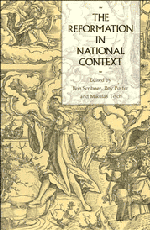Introduction
Published online by Cambridge University Press: 04 December 2009
Summary
‘The Reformation’ is the general label historians use to describe the series of upheavals in the religious life of Europe during the sixteenth and the first half of the seventeenth centuries. Its historical significance is assured because it touched not simply personal belief, but had a profound impact on the social, political and economic spheres. The church was shaken to its foundations, many of its institutionalised expressions were fatally weakened and even abolished in countries where the Reformation was most successful. It laid down patterns of religious allegiance which still persist today, dividing communities and nations, and provoking violent wars, confrontations and even revolutions as men and women of one religious mind set sought to impose their views on those holding another. The intensity and bitterness of conflict in Northern Ireland in our own age is a late echo of the religious confrontations of the Reformation period.
The Reformation began in Germany in the 1520s, with the ‘Luther affair’, the controversy precipitated by Martin Luther's attack on indulgences and the indulgence trade in October 1517. The subsequent furore spilled over from being a disagreement among theologians and churchmen into the wider public sphere, quickly drawing into its wake questions of politics, social grievance, popular religious discontent, constitutional and legal issues from the level of the Empire down to the smallest communities. It quickly spread beyond the borders of Germany, first into Germanspeaking territories such as Switzerland and Austria, into lands such as the Low Countries, then across more substantial linguistic borders into England, Scandinavia, France, Italy and into Eastern Europe.
- Type
- Chapter
- Information
- The Reformation in National Context , pp. 1 - 3Publisher: Cambridge University PressPrint publication year: 1994

